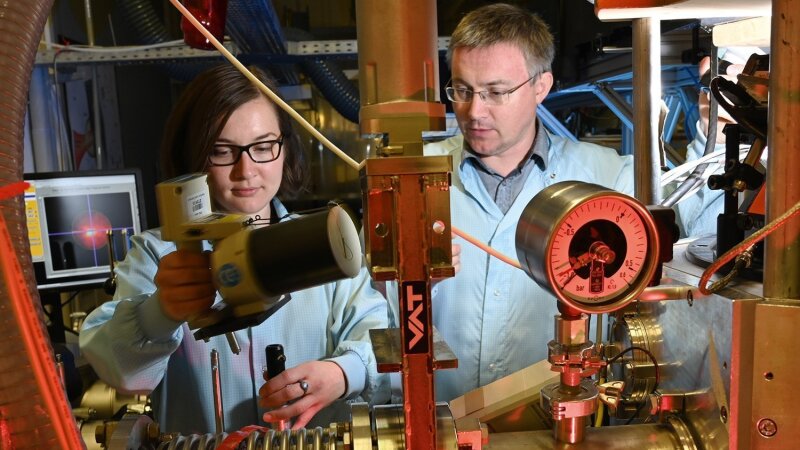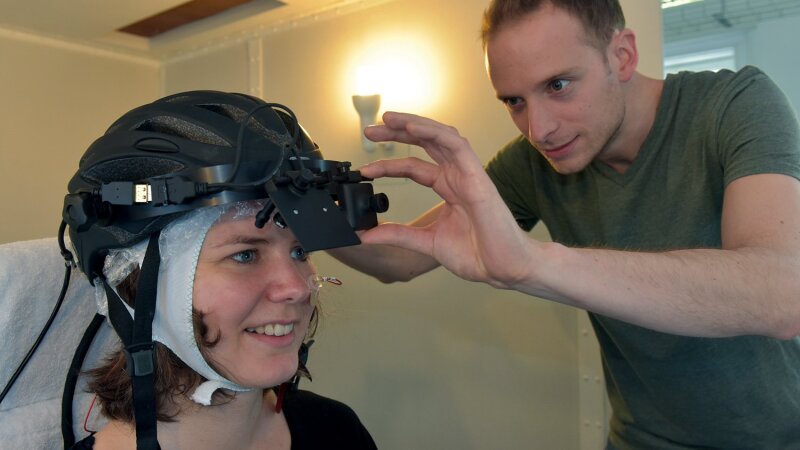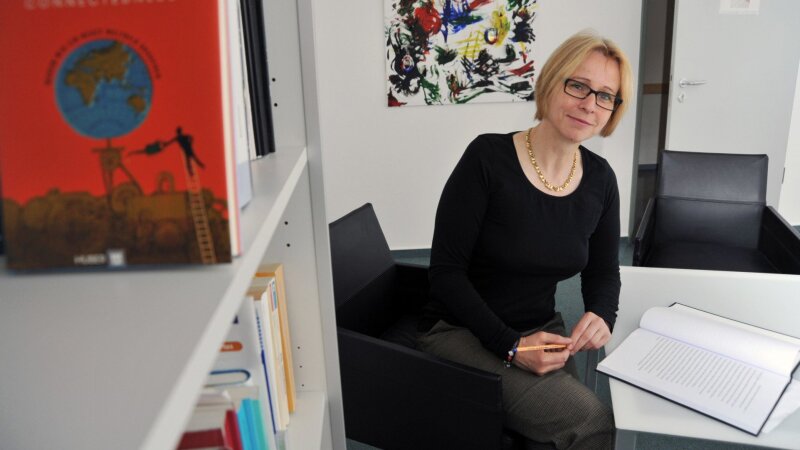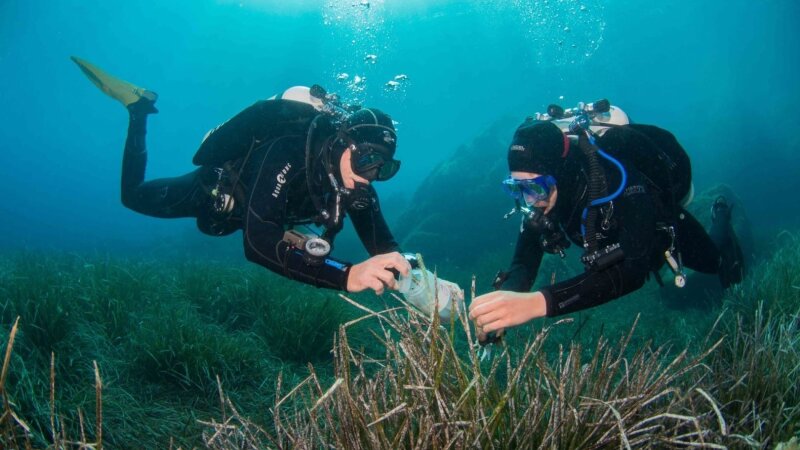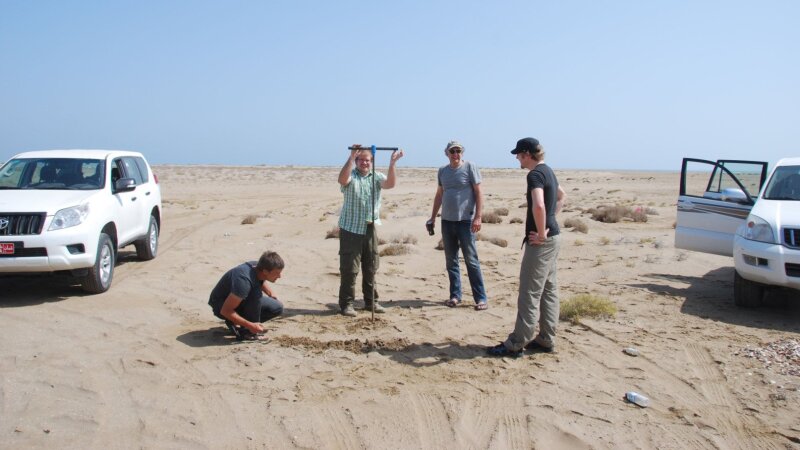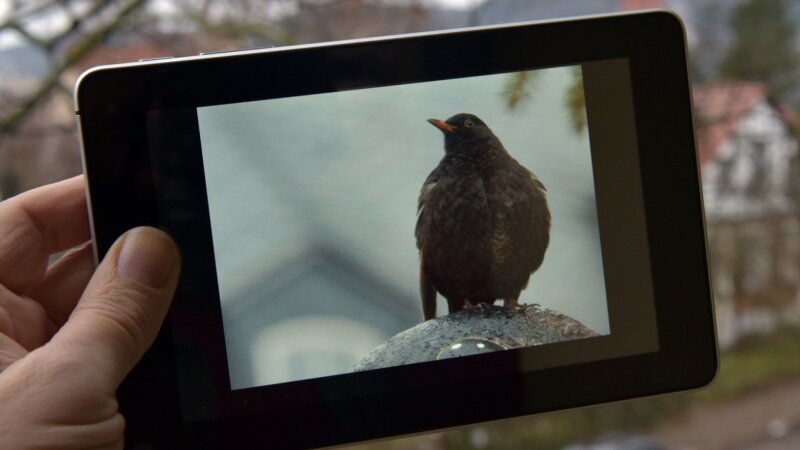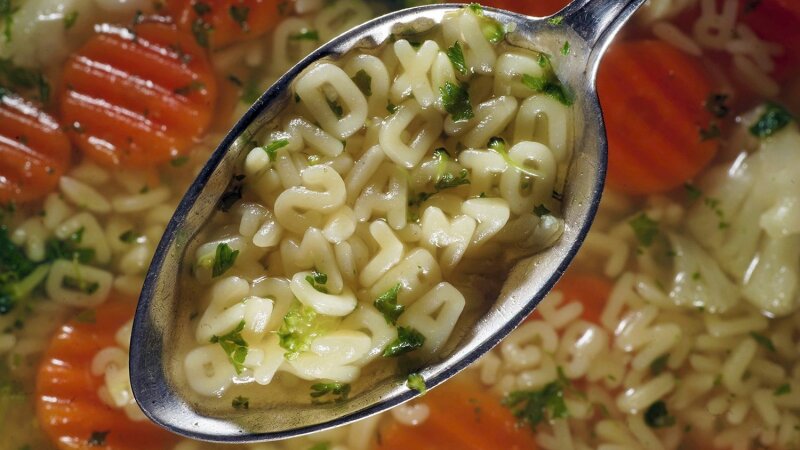Ticker
As hot as the sun’s core
The conventional states of matter—solid, liquid, and gas— are joined by another state: plasma. While over 99% of all matter in the universe is in this state, for example inside stars, creating a plasma on Earth is anything but simple. However, physicists working with Dr Zhanna Samsonova and Dr Daniil Kartashov (pictured below) have developed a method to create plasma for a few picoseconds in the lab (DOI: 10.1103/PhysRevX.9.021029External link). The researchers at the Institute for Optics and Quantum Electronics use extremely fine silicon wires that are heated with pulsed laser light. The wires are just a few hundred nanometres in diameter, which is smaller than the wavelength of the laser. This minimizes disruptive mirror effects, which are some of the main obstacles in the production of plasma. [sh]
Zhanna Samsonova and Dr. Daniil Kartashov while preparing an experiment with JETI-Laser
Image: Jan-Peter Kasper (University of Jena)European earthworm diversity
There are generally more earthworms in locations of temperate latitude than in tropical locations of the same size; and climate change could change where earthworms are found and alter their role in ecosystems around the world. This was the conclusion of a study conducted by the German Centre for Integrative Biodiversity Research (iDiv). The researchers worked with 140 scientists from around the world, including Prof. Dr Ulrich Brose and Prof. Dr Birgitta König-Ries from Jena, to compile the world’s largest earthworm database, containing information from 6,928 locations in 57 countries (DOI: 10.1126/science.aax4851External link). Earthworms make nutrients available, store climate-changing carbon, and spread seeds, but little was known about their global distribution until now. [VH]
A young earthworm.
Image: Andy MurrayFewer worries with a helmet
A bike helmet suggests safety—even when the person wearing one is not on the saddle. This discovery was made by a team of Jena-based psychologists directed by Dr Barbara Schmidt (pictured below) in cooperation with the University of Victoria in Canada (DOI: 10.1111/psyp.13458External link). The research team conducted an experiment in which they asked a group of people to play a gambling card game on the computer. They could choose between a high-risk and low-risk option. Half of the participants were wearing a bike helmet. The scientists used EEG to measure participants’ brain activity and discovered that wearing a bike helmet reduces cognitive control: The brain activity that characterizes the weighing up of alternatives in the decision-making process proved to be much lower than in the test subjects without a helmet. [sh]
Principal investigator Dr. Barbara Schmidt from the Institute of Psychology at the University of Jena demonstrates the equipment for the experiment, which examines the effect of safety accessories, such as a bicycle helmet, on risk behavior. Psychology student Jona Ebker assists in the background.
Image: Jan-Peter Kasper (University of Jena)Inclusion goals yet to be reached
The German education system and its actors continue to struggle with the issue of inclusion. Under the direction of Prof. Dr Bärbel Kracke (pictured below), education scientists at the Friedrich Schiller University and the Humboldt University of Berlin have examined how the city of Jena and its schools are addressing the inclusion of students with special educational needs. In their recently published volume, the authors demonstrate that not all schools are focusing on inclusion, but that some institutions are especially committed to the issue (ISBN 978-3-8309-3991-7). For example, comprehensive schools in Thuringia are particularly important for students with learning difficultiesdifficulties, whereas grammar schools often still dismiss inclusion. [sh]
Prof. Dr. Bärbel Kracke is a professor for educational psychology. She and her team, together with colleagues based in Berlin, have investigated how the city of Jena and its schools approach the inclusion of pupils with special educational needs.
Image: Anne Günther (University of Jena)Marine antibiotics
Almost three quarters of all antibiotics with clinically relevant antibiotics are natural substances, produced by bacteria. However, the antibiotics that are currently available are becoming less effective, as more and more pathogens are becoming resistant to them. In other words, there is an urgent need for new antibiotics, but less than 1% of the known bacteria types are of use in the search for active ingredients; the remaining 99% are »non-culturable«. Prof. Dr Christian Jogler and his team of researchers at the Institute of Microbiology have managed to cultivate and functionally characterize dozens of previously overlooked marine bacteria in the laboratory to make them available for systematic screening for active ingredients (DOI: 10.1038/s41564-019-0588-1External link). Their initial analysis indicates potential for the production of new antibiotics. [US]
Divers collect leaves of the Neptune grass (Posidonia oceanica) in the bay of Calvi on the island of Corsica. The research team led by Prof. Jogler has cultivated marine bacteria that had previously received little attention, thus opening up a source for new antibiotics.
Image: Christian JoglerOman hit by tsunami 1,000 years ago
Around 1,000 years ago, the coastline of the modern-day Sultanate of Oman was battered by 15-metre-high waves in a violent tsunami that pushed 100-ton boulders into the inland. This was found by a study carried out by the Universities of Bonn, Jena, Freiburg and the RWTH Aachen (DOI: 10.1016/j.margeo.2019.106068External link). The results also show how desperately the region needs an effective early warning system. But even then, coastal residents would only have 30 minutes at most to get to safety in the event of a similar disaster. Dr Christoph Grützner (pictured below) from the Institute of Geosciences is a member of the research team. For the study, he measured the geological layers in the huge blocks that were shifted by the tsunami. [AB]
Taking samples in Oman (from left): Christoph Grützner (University of Jena); Benjamin Koster, Klaus Reicherter and Sascha Schneiderwind (all University of Aachen).
Image: Gösta Hoffmann/Uni BonnAlgorithm learns with pictures of birds
One of the major challenges facing artificial intelligence (AI) is the ability to identify and distinguish between objects that only differ in a few minor details. Humans are already being supported by computer systems with this capability in many areas of modern life. For example, these systems can make life easier for biologists by automatically identifying animal and plant species. Prof. Dr Joachim Denzler and his team of computer scientists in Jena have now developed an algorithm for so-called »fine-grained object recognition«. Their chosen training platform was also inspired by nature: an international database containing 200 bird species from North America. This method has a recognition rate of around 90%. The algorithm can be used by anyone interested: https://birds.inf-cv.uni-jena.deExternal link. [sh]
A blackbird on the display of a tablet computer.
Image: Jan-Peter Kasper (University of Jena)Smartphone as a personal dietician
Under the direction of Prof. Dr Stefan Lorkowski, the Cluster of Excellence for Nutrition and Cardiovascular Health (nutriCARD) at the universities of Halle, Jena and Leipzig has developed a smartphone app to evaluate the nutritional value of processed food. The nutriCARD app is based on the »Nutri-Score« and provides data on the content, nutritional values, and questionable ingredients of food like biscuits, ready meals, and fizzy drinks. This information is processed using a database of the foodstuffs available in Germany, which currently contains around 300,000 products and 33,000 ingredients. The free app can be downloaded from the Apple App Store (»nutriCARD—gesünder essen«). An Android version is in the pipeline and will be released soon. More information: http://nutricard.baggid.comExternal link. [US]
The nutriCARD app provides data on ingredients, nutritional values and questionable ingredients of foods such as convenience food or soft drinks.
Image: Jan-Peter Kasper (University of Jena)